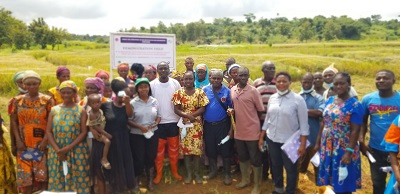
Rice farmers in Ntensere and Nkawie in the Atwima Nwabiagya Municipality of Ashanti have called on the government to intervene to control the activities of illegal gold miners (galamsey) to help them boost production and to improve their livelihood.
According to the farmers, galamsey activities in the areas were hampering extension of their farms as they have been made to cultivate rice on small portions of lands.
They have also called on government to help them with machines such as threshers and power tillers, to increase production of rice to ensure food security in the country.
The farmers made the appeal during a meeting with scientists from the Crop Research Institute of the Council for Scientific and Industrial Research (CSIR-CRI) at a rice demonstration farm at Sukwei, near Ntensere.
CSIR-CRI has established about an acre of four varieties of rice they had developed (Amankwatia, Agra, CRI Dartey and CRI Enapa) for the farmers to learn to produce rice using proper agricultural practices that would ensure high yields.
Started in 2020, the project, under the sponsorship of Korea-Africa Food and Agricultural Cooperation Initiative (KAFACI), aimed at enhancing rice seed system by ensuring high productivity, food security and livelihood improvement.
The project has been established in three communities, Aframso, Ntensere and Nkawie.
Totalling about 50, the farmers commended the CSIR-CRI for the project that has given them more insights into rice production by using the right technology and quality seeds.
During a tour of the farm, the farmers observed that all the four varieties were good but some have comparative advantages over others such as CRI Enapa which was tolerant to the dangerous rice yellow mottle virus.
Deputy Director of CSIR-CRI, Prof. Marian Quain, who led the team, said at the end of the project (2022/2023) the entire demonstration farm would be given to the farmers for free to enhance their livelihoods.
She was satisfied the extent to which the farmers had taken up the technology to improve their production and livelihood enhancement.
She said it was the mandate of the institute to develop and disseminate demand-driven technologies and build capacities for sustainable food and industrial crops productivity to improve life.
Prof. Quain urged them to embrace the improved seeds as they are drought and disease resistant and continue to adopt the right methods to increase yield.
Project Coordinator, Isaac Osei Tutu, added his voice to the farmers’ call on government to intervene by supporting them with machines to boost production.
He observed with worry the ascendancy of rice importation into the country and the only way to decrease that was the access to quality or improved seeds for high yields.
The seed scientist told the farmers to stick to the technology of planting rice in rows instead of their normal broadcasting way of planting which would not result in high yields.
Mrs Phyllis Aculey, seed scientist at the CSIR-CRI and project team member indicated how the farmers were sensitised about the importance of using and adopting quality seeds and how to plant them to ensure high yield.
The District Director of the Ministry of Food and Agriculture (MoFA) also pleaded with the government to curb the rate of galamsey in the areas to help the farmers to access large tract of lands toward higher productivity of rice.
FROM KINGSLEY E.HOPE,





